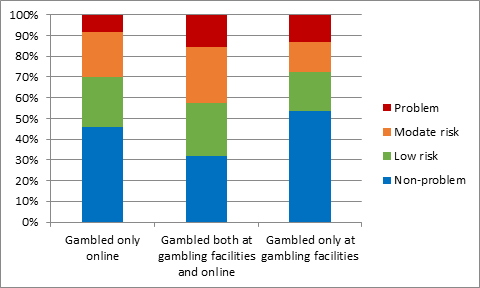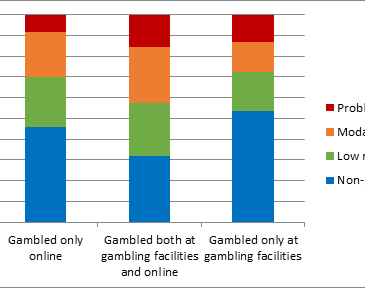Does gambling on the internet predispose people to gambling-related problems? Some early research suggested that people who gamble online are more likely than other gamblers to have gambling-related problems.[1] More recent evidence suggests that gambling involvement— either gambling more frequently or playing lots of different types of games—is associated with gambling problems.[2] This week, The WAGER reviews research by Sally Gainsbury and colleagues that explored the relationship between how people gamble and the problems they experience.
What was the research question?
Do people who gamble both at gambling facilities and online experience more gambling-related problems than those who gamble only at gambling facilities or only online?
What did the researchers do?
Dr. Gainsbury and her colleagues used Internet ads to recruit 4,594 Australian gamblers to complete an online survey. They compared participants who gambled only at gambling facilities, only online, and both at gambling facilities and online. Participants answered questions about gambling problems using the Problem Gambling Severity Index (PGSI), which groups participants into 4 categories: no gambling problems, low risk for gambling problems, moderate risk for gambling problems, and evidence of gambling problems.[3]
What did they find?
Participants who gambled both online and at gambling facilities were more likely to report gambling problems than those who only gambled online. In addition, gamblers who used both the Internet and gambling facilities were least likely to be in the “no gambling problems” group. See Figure.

Figure. Distribution of gambling problems by preferred mode of gambling (modified from Gainsbury et al., 2015). Click image to enlarge.
Why do these findings matter?
Some people think that Internet gambling is a cause of gambling related problems. Their solution is to ban or at least tightly regulate Internet gambling. However, this study suggests that Internet gambling might not be a cause of gambling problems. If Internet gambling were the source of the problem, then we would expect to see higher rates of problem gambling among any who gambled online compared to those who only gambled in gambling facilities. The results of this study support previous research that people who gambled in many different ways are at especially high risk for gambling problems.[4]
Every study has limitations. What about this one?
The study sample includes only Australian gamblers who have access to the Internet and responded to study ads. This limits generalizability to those without Internet access and to other jurisdictions where the modes and types of gambling available might differ.
For more information:
If you would like to take a brief, anonymous screen for gambling problems, click here to try the Brief Biosocial Gambling Screen (BBGS). If you are interested in learning more about the role gambling involvement plays in problem gambling, please review the articles in the footnotes below.
— John Kleschinsky
What do you think? Please use the comment link below to provide feedback on this article.
________________
[1] Griffiths, M. D., Wardle, H., Orford, J., Sproston, K., & Erens, B. (2009). Sociodemographic correlates of internet gambling: Findings from the 2007 British gambling prevalence survey. Cyber Psychology and Behavior, 12, 199–202.
[2] LaPlante, D. A., Nelson, S. E., & Gray, H. M. (2013). Breadth and depth involvement: Understanding Internet gambling involvement and its relationship to gambling problems. Psychology of Addictive Behaviors, Online First. doi: 10.1037/a0033810.
[3] Ferris, J., & Wynne, H. (2001). The Canadian problem gambling index: Final report. Ottawa: Canadian Centre on Substance Abuse.
[4] Afifi, T. O., LaPlante, D. A., Taillieu, T. L., Dowd, D., & Shaffer, H. J. (2014). Gambling involvement: considering frequency of play and the moderating effects of gender and age. International Journal of Mental Health and Addiction, 12(3), 283-294.
Laplante, D. A., Afifi, T. O., & Shaffer, H. J. (2012). Games and gambling involvement among casino patrons. Journal of Gambling Studies, 29(2), 191-203. doi: 10.1007/s10899-012-9307-z
LaPlante, D. A., Nelson, S. E., & Gray, H. M. (2013). Breadth and depth involvement: Understanding Internet gambling involvement and its relationship to gambling problems. Psychology of Addictive Behaviors, Online First. doi: 10.1037/a0033810.
LaPlante, D. A., Nelson, S. E., LaBrie, R. A., & Shaffer, H. J. (2011). Disordered gambling, type of gambling and gambling involvement in the British Gambling Prevalence Survey 2007. European Journal of Public Health, 21(4), 532-537. doi: 10.1093/eurpub/ckp177
Phillips, J. G., Ogeil, R., Chow, Y. W., & Blaszczynski, A. (2013). Gambling involvement and increased risk of gambling problems. Journal of Gambling Studies. doi: 10.1007/s10899-012-9325-x
Welte, J. W., Tidwell, M. O., Barnes, G. M., Hoffman, J. H., & Wieczorek, W. F. (2015). The Relationship Between the Number of Types of Legal Gambling and the Rates of Gambling Behaviors and Problems Across US States. Journal of Gambling Studies, 1-12.





Elizabeth George February 3, 2016
Very interesting….as always.